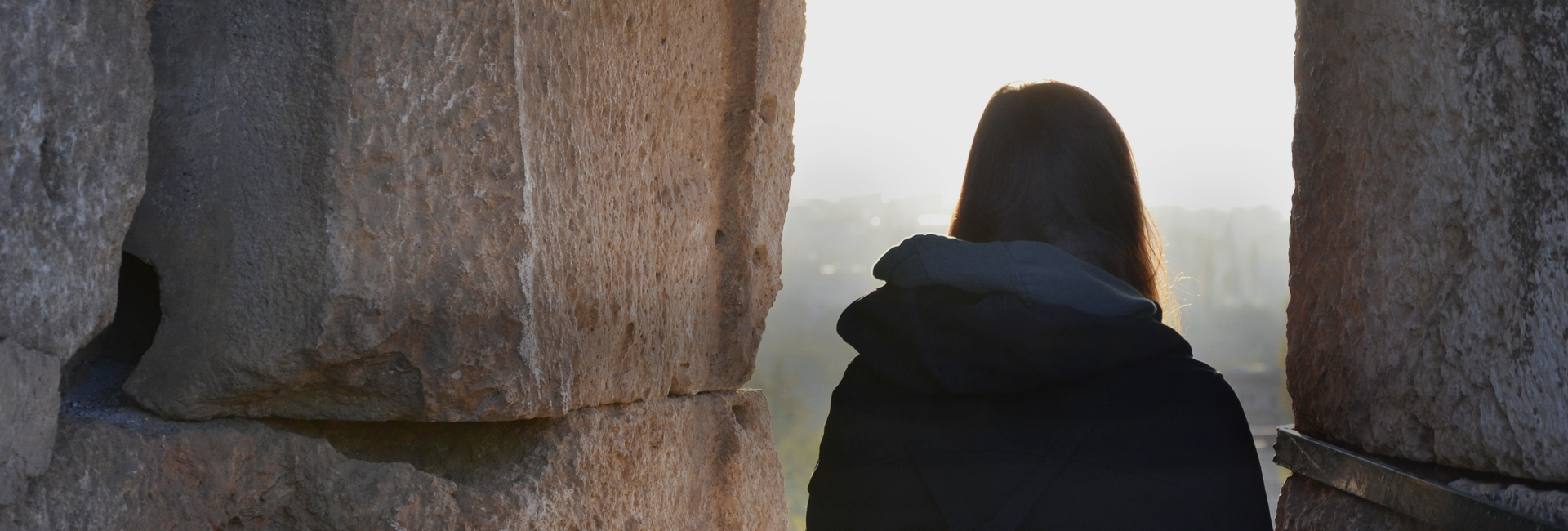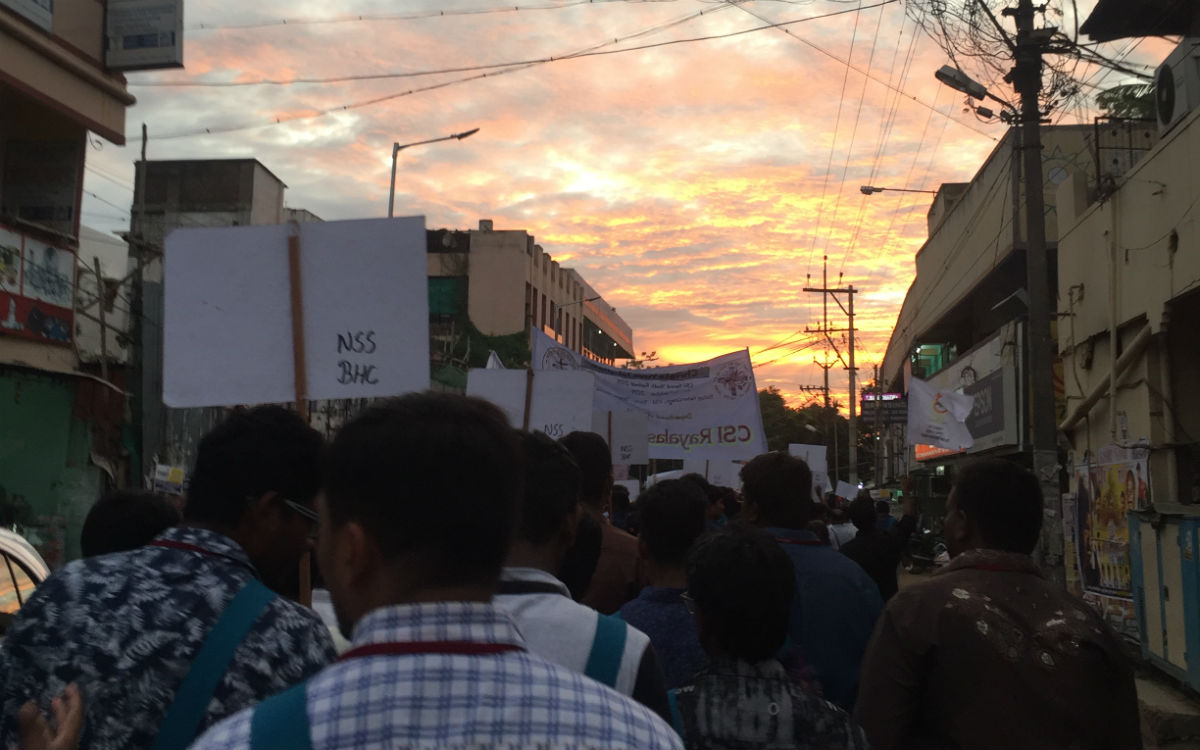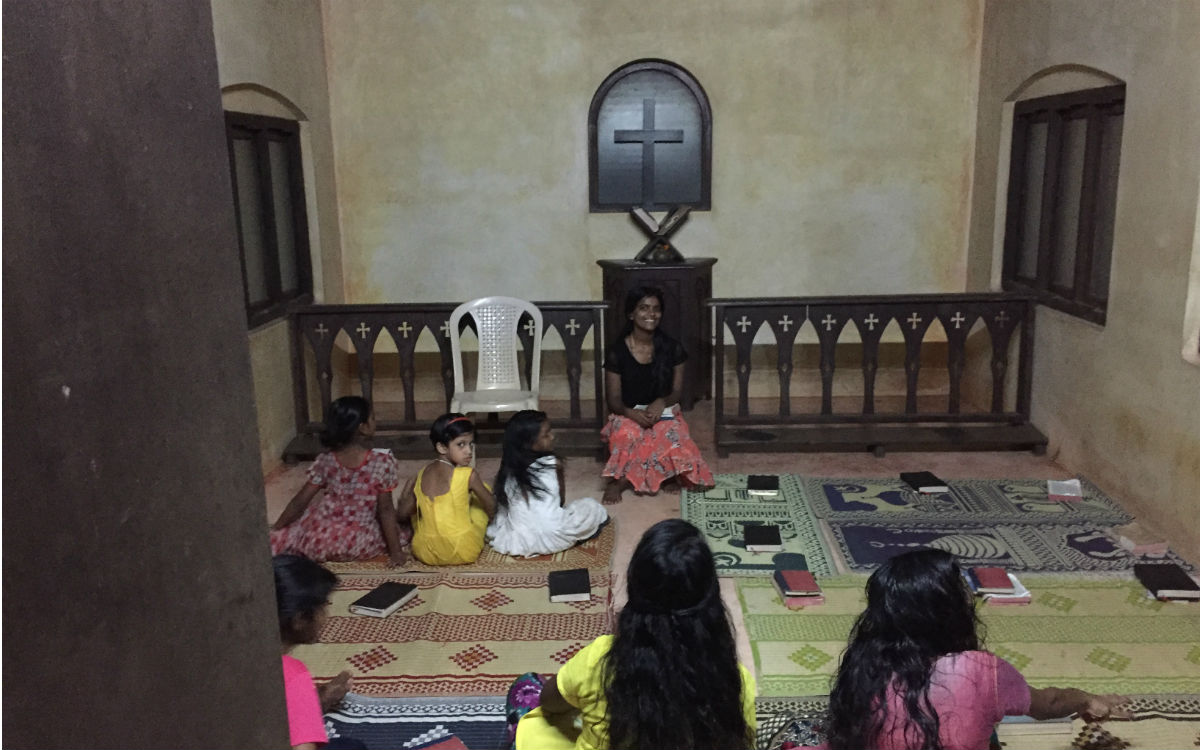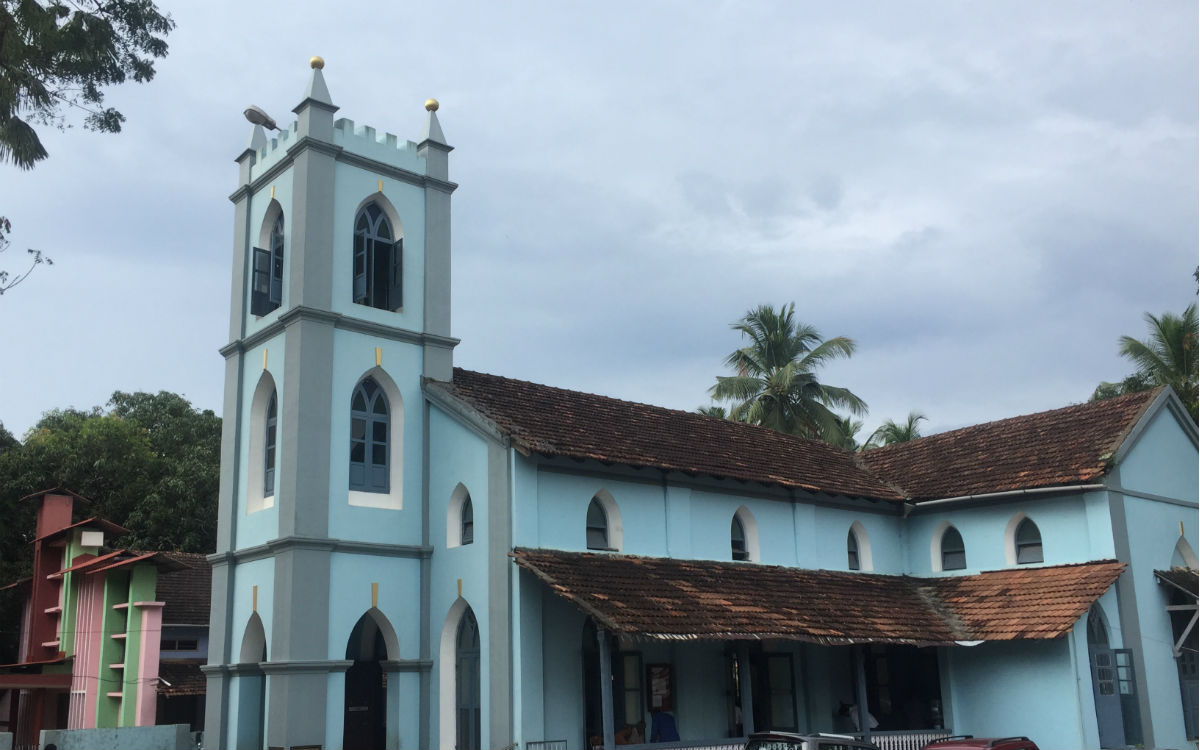
Weltweit erlebt
9 Freiwillige weltweit. Täglich neue Eindrücke und Erlebnisse. Kleine und große Herausforderungen. Erfahrungen für das ganze Leben – all das ist das Ökumenische FreiwilligenProgramm der Evangelischen Mission in Solidarität (EMS)

Was bedeutet Christ-sein?
Für diesen Blogbeitrag habe ich mich mit Sister Grace John zusammengesetzt und ihr einige Fragen zum Thema 'Religion im Alltag' gestellt. Sie wohnt bei uns im Students Home und ich wollte die Möglichkeit nutzen, um mehr über Religion auch im Allgemeinen zu erfahren. Ihre Antworten sind keine Eigeninterpretation sondern mitgeschriebene Zitate, das heißt, es muss nicht mit meiner eigenen Wahrnehmung des Alltags und der Gesellschaft hier übereinstimmen.
1. Ist Religion noch immer ein wichtiger Aspekt im Alltag?
Ja, natürlich. Auf der einen Seite sind es die Rituale jedes einzelnen. Dass man sonntags in die Kirche geht oder vor dem Essen betet. Auf der anderen Seite ist es eine tiefere Hingabe. Die Erziehung der Kinder, welche Werte man ihnen beibringt. Oder dass wir uns um Kranke und Arme kümmern sollen, sowie um die Alten. Diese christlichen Werte begleiten uns durch den Tag.
2. Wie wird Religion im Alltag ausgelebt?
Viele lesen täglich in der Bibel, oder, wie ich schon sagte, das Beten vor dem Essen. Für mich ist es auch Meditation und Achtsamkeit in der ich Gott suche.
3. Trennt oder verbindet das Ausleben der verschiedenen Religionen die Menschen hier in Indien?
Also, die Religionen haben an sich die Botschaft Menschen anderen Glaubens zu lieben. In Indien leben sie auch sehr friedlich zusammen. Aber viele Eltern haben eine bestimmte Meinung zu Religionen, die sie ihren Kindern beibringen. Für sie gibt es dann eher Unterschiede. Hier in dieser Einrichtung sehen wir keine Unterschiede. Wir haben Hindus und Christen. Trotzdem behandeln wir alle gleich und wollen, dass die Kinder lernen dasselbe zu tun.
4. Was beeinflusst Religion im Laufe des Lebens?
Im Christentum haben wir ein paar sehr wichtige Meilensteine im Leben. Als Erstes die Taufe, wenn die Kinder noch sehr jung sind, die aufgrund des Glaubens der Eltern durchgeführt wird. Wenn sie dann alt genug sind zu verstehen, was der Glaube bedeutet und auch ihre eigenen Erfahrungen gesammelt haben, gibt es die Konfirmation. Was eine sehr wichtige Rolle spielt ist die Ehe. Eine christliche Ehe ist etwas heiliges und voller Reinheit. Das gibt es nicht in anderen Beziehungen. Und dann, am Ende des Lebens ist natürlich die Beerdigung.
5. Wird sich mit Religion auch kritisch auseinandergesetzt oder wird sie eher akzeptiert wie sie ist?
Es ist eines der wichtigsten Themen in Kerala, wenn nicht sogar in ganz Indien. Da sich unsere Regierung religiös positioniert, fangen mehr und mehr Menschen an die Rolle der Religionen in unserer Gesellschaft zu hinterfragen und zu diskutieren. Es ist aber auch mit dem Kastensystem verbunden. Indien versucht dem entgegenzuwirken, während Religionen noch darauf beharren, selbst das Christentum in manchen Staaten. Viele reden gerade über dieses Problem.
6. In welche Richtung entwickelt sich Religion und Religiosität gerade?
Man kann auf jeden Fall eine Veränderung in der Gesellschaft heutzutage erkennen. Junge Leute gehen nicht mehr in die Kirche, wie wir es taten, sie sind oft zu beschäftigt oder denken es ist zu viel Hingabe. Sie wollen unabhängig sein und haben keine Zeit wegen Arbeit oder den Medien. Sie nehmen Filme oder Geld als neue 'Religionen'.
Wie erlebe ich hier Religion im Alltag? Jeden morgen und abend treffen wir uns zum Prayer, am Sonntag gehen wir in die Kirche und in letzter Zeit meist noch zu weiteren kirchlichen Veranstaltungen. Wir singen Lieder in der Kirche und wenn ich krank bin wird für mich gebetet. Der Glaube ist viel tiefer im Alltag verwurzelt als in Deutschland. Auch wenn es viele kleine tägliche Rituale sind, ist es hier doch etwas Selbstverständliches. Auch wenn ich manchmal von den neuen Abläufen in der Kirche etwas überfordert bin, tut es gut mit den Kindern fast jeden Sonntag vorzusingen. Auch wenn ich immer noch überrascht bin wie offen Religion hier präsentiert wird, fühlt es sich doch richtig so an. Viele neue Eindrücke, wie man Religion lebt. Aber so Vieles das noch zu lernen ist, oder dass ich nie verstehen werde. Der tiefe Glaube vieler Christen, die ich in der Kirche hier getroffen habe, oder auch der Kinder im Student's Home hat mich aber auch sehr zum Nachdenken gebracht. An was glaube ich? An wen will ich glauben? Will ich meinen Glauben auf diese Weise ausleben, oder ist mir das zu fremd? Was habe ich über Glauben in Deutschland gelernt, das ich wieder 'verlernen' muss? Und wie passt das Alles in meinen Alltag?
Ich hoffe euch hat der Blogeintrag gefallen, es ist diesmal auf jeden Fall auch etwas zum drüber Nachdenken dabei. :)
Ich schicke ganz liebe Grüße nach Deutschland,
Eure Valérie
For this blogpost I sat with Sister Grace John, who is living with us in the Student's Home, to talk about religion in our everyday life. I wanted to use this opportunity and also asked a bit about religion in general in India. I hope you enjoy the conversation. :)
1. Do you think that religion still plays an important role in the everyday life?
Yes, sure. On the one hand it is the commitment of each person. Going to church on Sunday, praying before eating. On the other hand it's something more deeply rooted. The upbringing of your children, which values you are teaching them. That we will take care of the sick and poor. That we help old people. These Christian ethics guide us through our day.
2. How do Christians live religion in their everyday life?
There's the bible reading a lot of people do, or as I said praying before eating. For me, it also includes meditation and mindfulness in seeking God.
3. Do you think the coexistence of the different religions in India is more dividing or connecting?
So, the religions themselves tell to love those with other faiths. In India they live together very peacefully. But parents often have a typical attitude that they teach their children. For them it's more to see their differences. Here in this institution we see no difference. We have Hindus here and Christians. Still we treat everyone the same and want the children to learn to do so as well.
4. What influence has religion in the course of life?
In Christianity we have a few very important milestones in life. First, the babtism of the small children which is done because of their parents believe. When they are able to understand their faith and connect it to what they experience in their lifes, there is the confirmation. What plays an important role is the marriage. A Christian marriage is very holy and full of purity. You don't have this in other relationships. And then, surely, at the end of life there is the funeral.
5. Is religion also a topic that is discussed and criticized or more or less accepted as it is?
It is one of the main topics in Kerala or even India right now. Because of our govornments religious position more and more people start questioning and discussing about its role in our society. Its also linked to the caste system. The govornment has long abolished it but still religions, in some states even Christianity, are keeping it up. This is a big issue which is talked about a lot.
6. In which direction do you see religion evolving?
We can definitely see a change in our society nowadays. Young people are not going to church as we were, they often are too busy and think it's too much of a commitment. They also want to be very independent and have no time because of work or media. Movies and money are becoming their new 'religions'.
What I would like to say:
Religion, or so it seems to me, plays a much bigger role here in India than in Germany. Although like in Germany younger people are now growingly distancing themselves from church, for many people it is an essential aspect of life. Visiting the church on sundays, maybe singing in the choir and praying for a sickness to pass etc. are common (from what I've seen in my environment). Especially here in my project place Christianity is embedded in what we do ever yday. As the first thing in the morning to start the day and in the evening to end the day the prayertime plays a crucial role. The children themselves are choosing which psalm is read and which song is sung. Before every meal we sing a prayer and we also pray before leaving the house. On sundays we go to church and most of the children join the Sunday school as well. Not believing seems to be a strange thought to the children when I told them about religion in Germany. They explained to me that even though there are so many religions in India, they don't really care to whom their friends are praying. I liked this simple approach, due to the fact that in Germany religion is still something very dividing between people. All in all religion in India is something incredible and I want to learn even more about it in the time I have here.
I hope you liked this blogpost, this time there's a lot to think about. :)
Until next time, Valérie


